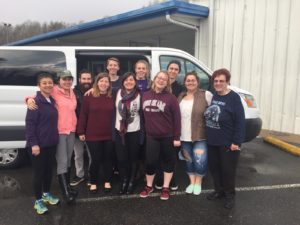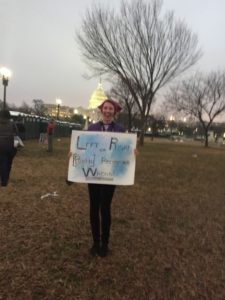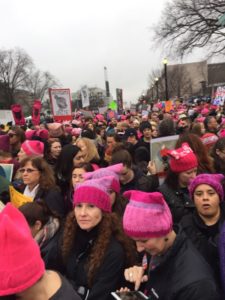
11 students and community members prepare to leave for Washington, D.C. from Cullowhee on Jan. 20. L-R: Nilofer Coutour, Isabel Coutour, Gabe Cosenza, Joanna Woodson, Kimberly Werth, Kelsey Woodford, Katie Balough, Fiona Buchanan, Zack Daniels, Emma Tate and Donna Dupree. Photo courtesy of Joanna Woodson.
As WCU junior Joanna Woodson boarded a transport van to Washington, D.C. just after dawn on the morning of Jan. 20, Inauguration Day, she knew that her destination would be teeming with “nasty women” on a mission to make their voices heard.
She didn’t know that 24 hours later, her group of 11 activists would take part in the largest public protest in U.S. history.
Intended to send a message to the incoming Trump presidential administration, the Women’s March on Washington encouraged women’s rights proponents to “join in diversity to show our presence in numbers too great to ignore,” the movement’s mission statement said.
An estimated 3.5 million demonstrators participated in marches nationwide, surpassing the 1982 Anti-Nuclear March in New York City as the largest American protest ever held. One million protesters were represented during that movement.
In addition to the millions of Americans marching, similar international protests sprang up in Europe, Africa and individual countries like India and Serbia.

WCU student Kimberly Werth holds up a sign of protest in front of the U.S. Capitol building on Jan. 21. The sign reads. “Left or right, both recognize wrong.” Photo courtesy of Joanna Woodson.
Fighting for freedom is nothing new to Woodson. A co-leader of the Student Democracy Coalition, the 23-year-old was heavily involved in last year’s election services, working to make poll access for students as easy as walking into the library or dining hall.
Whether helping secure $10,000 in grants for “elections-related programming” or driving a shuttle van to and from the nearest polling place, Woodson is a firm believer in the democratic process. She said that’s why she felt compelled to organize the eight-hour trip to freedom’s front office.
“We’re very concerned about the direction this country is going in,” Woodson said. “But instead of being angry alone or sad alone, we joined together with hundreds of thousands of other people to take a stand.”
Despite an online counter-movement detracting from the necessity for a “women’s rights” demonstration, supporters have solidified around a slew of prominent social issues. With crowds of 250,000 in New York City, 750,000 in Los Angeles and a half-million at the flagship march in D.C., Woodson says that the feminine resistance surfacing around the globe is long overdue.

Demonstrators fill the streets of Washington, D.C. The protest would become the largest in American history. Photo courtesy of Joanna Woodson.
“I like what Martin Luther King Jr. said, ‘The arc of the moral universe is long, but it bends toward justice,’” said Woodson. “And I think this an excellent example of morality taking a stand and pushing back.”
While the focus of the protests centered around women, a substantial number of male demonstrators were scattered throughout the crowd, including two who made the trip with Woodson. WCU student Gabe Cosenza said that although he’s on board with the march’s message, he didn’t realize the power that would accompany the waves of women speaking up for their rights.
“It was a learning experience more than anything,” he said. “It was a driven intensity, but it wasn’t violent at all. The passion within the march was visible.”
But Cosenza said that for any good to come out of a generation-defining insurrection, all sides must first take on a common goal.
“I learned quickly that their problems are our problems,” said Cosenza. “And it’s gonna take all of us to solve it.”


